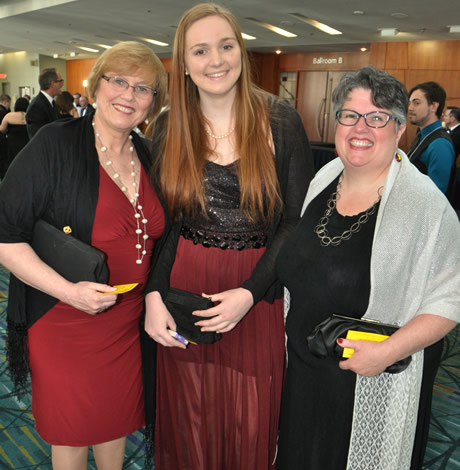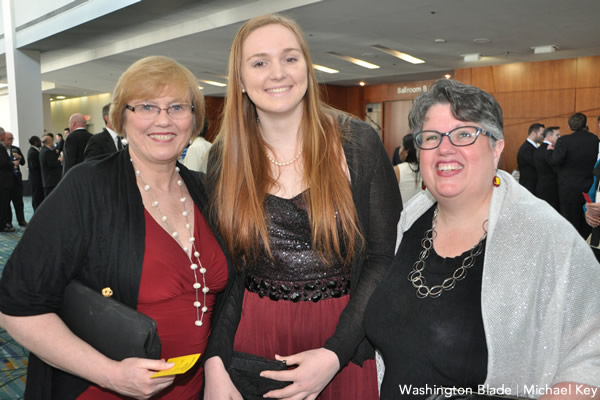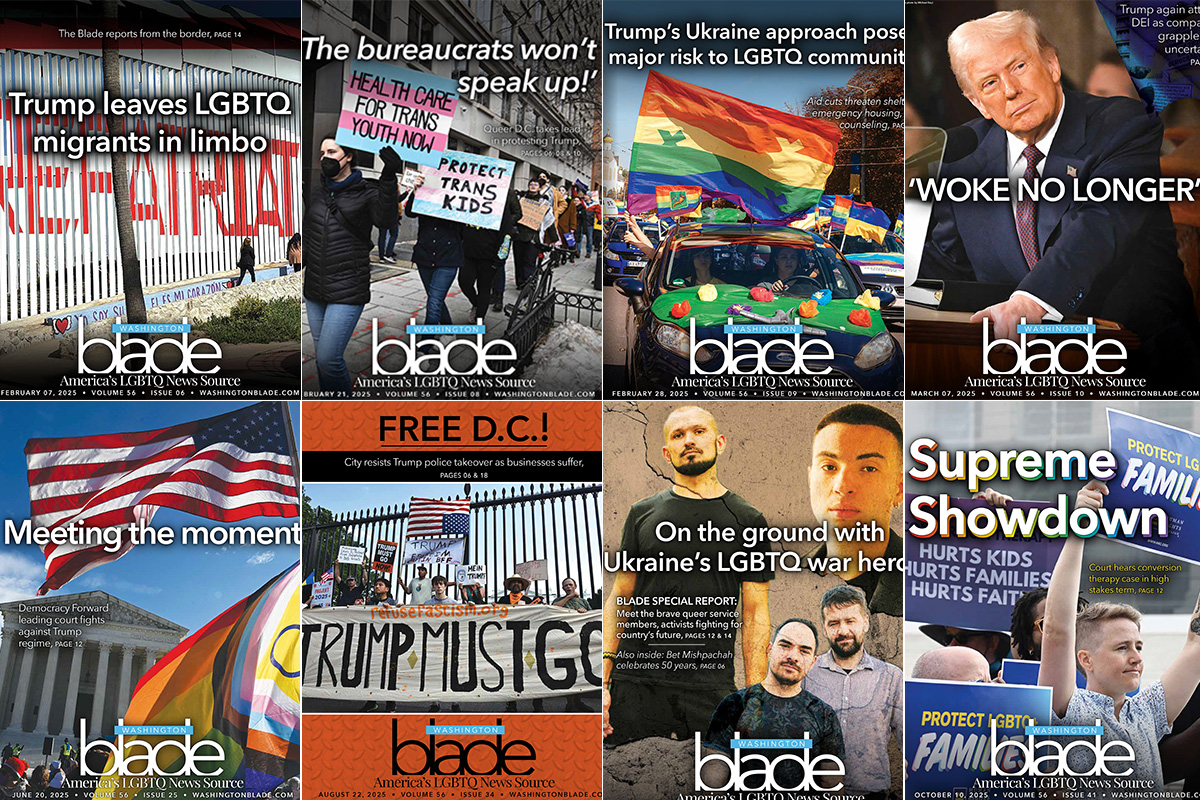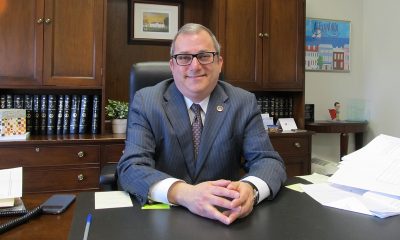Opinions
LGBT parents and our children in 2014
Courts, pop culture score victories for our families


From left, Mary Townley, daughter Emily Schall-Townley and wife Carol Schall attended the 2014 Equality Virginia Commonwealth Dinner on April 5. The Schall-Townleys were plaintiffs in the same-sex marriage case in Virginia. (Washington Blade photo by Michael Key)
Did 2014 bring LGBTQ parents and our children closer to equality? Most visibly, it was the year that marriage equality spread to most of the U.S. — a great thing for many families, but certainly not all that happened.
Marriage, of course, opened up legal and financial benefits, as well as a sense of fairness and inclusion, to tens of thousands of children being raised by same-sex couples. It also brought with it an expansion of parenting rights in some states. In Virginia, for example, married same-sex couples may now do second-parent adoptions or jointly adopt. Utah and North Carolina will now issue amended birth certificates to same-sex couples wanting second-parent adoptions.
We should remember, however, that marriage and parental rights are not identical. Different-sex parents do not need to be married in order to be recognized as legal parents, and neither should same-sex parents. The Idaho Supreme Court recognized this in February, before marriage equality became legal there in October, when it ruled that a person can petition for a second-parent adoption even if the two adults are not married.
Parents gave back to the marriage equality struggle, too. Many of the plaintiffs in the marriage equality cases were parents, and most of the judges in those cases weighed the interests of children very heavily. Many cited a passage from the U.S. Supreme Court’s June 2013 Windsor decision noting that marriage inequality “humiliates tens of thousands of children now being raised by same-sex couples.”
The 7th Circuit’s Richard Posner focused clearly on this angle, writing that while the cases were formally about discrimination, “at a deeper level … they are about the welfare of American children.”
He then gave us the snarkiest statement from any marriage case this year: “The only rationale that the states put forth with any conviction—that same-sex couples and their children don’t need marriage because same-sex couples can’t produce children, intended or unintended—is so full of holes that it cannot be taken seriously…. Heterosexuals get drunk and pregnant, producing unwanted children; their reward is to be allowed to marry. Homosexual couples do not produce unwanted children; their reward is to be denied the right to marry. Go figure.”
Marriage aside, we should not forget other types of cases that impacted our families. The New Hampshire Supreme Court ruled in July, for example, in the case of a biological mother trying to deny parental rights to a former partner—a type of case we have seen too many of over the years. The court ruled that a non-biological mother is the legal parent of her daughter, and has the right to seek custody after a breakup.
All was not progress, however. A lesbian teacher at an all-girls Catholic school in Michigan said she was fired in August when the school cited a policy permitting firing over “lifestyle or actions directly contradictory to the Catholic faith.” School administrators were concerned that her pregnancy through assisted reproduction was “nontraditional,” she said. Ironic for a church founded on a nontraditional pregnancy.
And in a puzzling decision, Brooklyn Surrogate’s Court Judge Margarita López Torres ruled in January that a married two-mom couple were already both legal parents to their child, so the non-biological mother could not do a second-parent adoption. Second-parent adoptions, however, are recommended by most LGBTQ family law experts even for married couples, since they give a non-biological parent and child a more secure legal connection in jurisdictions that don’t recognize the parents’ marriage.
It was also a good year for mainstream visibility. Iconic brands Coca-Cola and Chevrolet featured gay dads in television commercials during the Olympics. Honey Maid (Nabisco), Marriott, Starbucks, Target, and General Mills Canada also ran commercials or online video campaigns featuring same-sex parents.
On the screen, the Amazon Web series Transparent gave us the story of an older parent coming out as transgender—and has been nominated for two Golden Globe awards. ABC comedy Modern Family continues to show us gay dads as part of a wider network of extended family.
All in all, then, it was a pretty good year for both LGBTQ family rights and visibility, though weighted toward the same-sex parents among us. It sets the stage for an even more impressive 2015.
Dana Rudolph is the founder and publisher of mombian.com, a GLAAD Media Award-winning blog and resource directory for LGBT parents.
Opinions
Support the Blade as mainstream media bend the knee for Trump
From CBS to Washington Post, MAGA taking over messaging

We knew it would be bad. I’m referring, of course, to 2025 and the unthinkable return of Donald Trump to the White House.
We just didn’t know how bad. The takeover of D.C. police. ICE raids and agents shooting defenseless citizens in the face. The cruel attacks on trans Americans. A compliant and complicit right-wing Supreme Court and GOP rubberstamping all the criminality and madness.
Much of that was outlined in Project 2025 and was predictable. But what has proven surprising is the speed with which major companies, powerful billionaires, and media conglomerates have hopped on board the authoritarian train and kissed Trump’s ring. Tech giants like Apple and Meta and media companies like CBS and the Washington Post have folded like cheap tents, caving to MAGA pressure and enabling Trump’s evil agenda.
The guardrails collapsed in 2025. Congress has ceded its role as a formerly co-equal branch of government. Once trusted media outlets have betrayed their audiences’ trust and morphed into propaganda arms of the White House. As a lifelong journalist, this is perhaps the most shocking and disappointing development of the past year.
The Washington Post, which adopted the ominous tagline of “Democracy Dies in Darkness,” killed its endorsement of Kamala Harris in the final days of the 2024 campaign. Same thing at the Los Angeles Times. More recently, CBS’s vaunted “60 Minutes” spiked a story critical of Trump’s immigration policies under the direction of new editor-in-chief Bari Weiss, a Trump toady and the antithesis of a journalist.
Concurrently, media companies large and small are fighting to survive. Government grants have been rescinded and the Corporation for Public Broadcasting, responsible for funding NPR and PBS, announced plans to dissolve. The Pittsburgh Post-Gazette, a nearly century-old Pulitzer Prize-winning institution, announced this week it will close on May 3. The Washington Post has lost scores of talented journalists, including prominent LGBTQ voices like Jonathan Capehart. The Baltimore Sun was acquired by the same family that owns right-wing Sinclair Broadcasting, ending a nearly 190-year tradition of award-winning, independent journalism.
It is not a coincidence that Trump’s attacks on democracy, traditions, and norms are happening while the media industry collapses. News deserts are everywhere now. In 2024, 127 newspapers closed, leaving 55 million Americans with limited or no access to local news, according to a report by Medill.
There’s a reason the media are called the “Fourth Estate.” Journalism was considered so critical to the health of our democracy that the Founding Fathers spelled it out in the First Amendment. Democracy and our Constitution cannot survive without a free and robust press.
That’s why I felt compelled to write this appeal directly to our readers. For nearly 57 years, the Blade has told the stories of LGBTQ Washington, documenting all the triumphs and heartbreaks and writing the first draft of our own history. Today, we remain hard at work, including inside the White House. This week, we have a reporter on the ground in Colombia, covering the stories of queer Venezuelan migrants amid the crisis there; another reporter will be inside the Supreme Court for next week’s trans-related cases; on Sunday, we have a reporter on the red carpet at the Golden Globes ready to interview the stars of “Heated Rivalry.”
We do a lot with a little. As major companies pull back on their support of the LGBTQ community, including their advertising in the Blade, we turn to our readers. We have never charged a dime to read the Blade in print or online. Our work remains a free and trusted resource. As we navigate these challenges, we ask that you join us. If you have the resources, please consider making a donation or purchasing a membership. If not, please subscribe to our free email newsletter. To join, visit washingtonblade.com and click on “Fund LGBTQ Journalism” in the top right navigation.
Our community is known for its resilience. At the Blade, we’ve weathered the AIDS epidemic, financial crises, and a global pandemic. We are committed to our mission and will never bend to a wannabe dictator the way so many mainstream media outlets have done. The queer press is still here and with your help we will survive these unprecedented attacks on democracy and emerge stronger than before. Thank you for reading the Blade and for considering making a donation to support our work.
Kevin Naff is editor of the Washington Blade. Reach him at [email protected].
Opinions
Time has run out for the regime in Venezuela
American forces seized Nicolás Maduro, wife on Jan. 3

Time has run out for the regime in Venezuela.
I am fully aware that we are living through complex and critical days, not only for my country but also for the entire region. However, the capture of Nicolás Maduro has renewed hope and strengthened my conviction that we must remain firm in our cause, with the certainty that the valid reward will be to see Venezuela free from those who continue to cling illegitimately to power.
In light of this new reality, I adopt a clear, direct, and unequivocal position:
I demand the immediate release of all political prisoners.
I demand that all persons arbitrarily detained for political reasons be returned to their families immediately, without delay or conditions.
According to Foro Penal, as of Jan. 5, 2026, there are 806 political prisoners in Venezuela, including 105 women, 175 military personnel, and one adolescent, and a total of 18,623 arbitrary arrests documented since 2014. The same report documents 17 people who have died while in State custody and 875 civilians prosecuted before military courts, clearly evidencing the use of the judicial and security apparatus as instruments of political persecution. In parallel, the humanitarian system estimates that 7.9 million people in Venezuela require urgent assistance, further aggravating the impact of repression on daily life.
Behind these figures are shattered lives, separated families, and destroyed life projects. Students, activists, human rights defenders, political leaders, and members of the armed forces remain imprisoned without judicial guarantees, without due process, and without justice.
Since the capture of Nicolás Maduro, repression has not ceased. On the contrary, more than ten journalists have been arbitrarily detained, while others have been harassed, imprisoned, or mistreated for carrying out their duty to inform. Today, journalism in Venezuela has become a heroic and high-risk act.
This situation is further aggravated by a new attack on fundamental freedoms: an illegitimate decree of “external state of emergency”, whose purpose is to legalize state terrorism, expand the scope of repression, and deepen the criminalization of dissent and freedom of expression.
The destruction of freedoms cannot and must not be normalized, either by society or by the international community.
I do not forget the atrocities committed against people deprived of their liberty: systematic violations of due process, torture, cruel, inhuman, and degrading treatment, denial of medical care, and prolonged isolation.
These practices have been widely documented and denounced and are currently under investigation by international justice mechanisms.
In this regard, the United Nations Independent International Fact-Finding Mission on Venezuela has repeatedly expressed grave concern over the persistence of serious human rights violations, including the use of torture, enforced isolation, and the responsibility of State security forces in systematic abuses, as reflected in its statements and reports issued on Jan. 3, 2026, and throughout 2025.
From my unwavering commitment to human rights, I issue a firm and urgent call to Venezuelan citizens and to all people in the free and democratic world to stand together in defense of human dignity.
All political prisoners must be released now.
All torture and detention centers must be closed.
I am convinced that there can be no genuine democratic transition without the immediate release of political prisoners, the submission to justice of those responsible for arbitrary detentions, and the establishment of accountability mechanisms, guarantees of non-repetition, and full reparation for victims and their families. This is the only viable path toward a proper transition to democracy in Venezuela.
Today, more than ever, I stand in solidarity, inside and outside Venezuela, with the victims and their families.
This is a moment of definition, not of silence or hesitation.
I assume, together with millions of Venezuelans, that we are co-responsible for our collective reality and for the new Venezuela that we are called to rebuild.
Dignity, freedom, and justice cannot wait.
Freedom for Venezuela.
Juan Carlos Viloria Doria is president of the Global Alliance for Human Rights and vice president of Venezolanos en Barranquilla, an NGO based in Barranquilla, Colombia.
Opinions
Just say no to the felon in the White House
Democrats, media must do more to oppose Trump’s agenda

We have a clearly deranged, sick, felon as president, who can’t even remember if he had an MRI, or a CT. He says he takes enough aspirin to keep his blood running thin in his veins. He fakes health reports, and lies every time he opens his mouth. His brain appears foggier than Joe Biden’s ever was.
The felon arranged to get a fake Peace Prize from the soccer federation, while taking military actions around the world. He sanctioned American attacks on Nigeria, Iran, Syria, and now on the government, and people, of Venezuela. He has our military attacking boats, claiming they are carrying drugs, with no proof. He interferes in foreign elections, making the United States less safe. He obviously supports Putin in his war against Ukraine, and supports Netanyahu’s destruction of Gaza, and his starvation of the Palestinian people there. Because of all this it’s understandable why he calls his Secretary of Defense, his Secretary of War. That individual being unqualified with no competence, or decency — the perfect toady for the fascists surrounding Trump. He has a Secretary of State in Marco Rubio who clearly has no principles at all. Rubio previously said, “Donald Trump – a con artist – will never get control of this party…We cannot allow a con artist to get access to the nuclear codes of the United States of America.” He compared Trump to a “third-world strong man.” Now as Secretary of State he justifies all the illegal actions the felon takes.
I, and many others, question “Where is Congress in all this?” Do no Republicans in Congress have any cojones? Two Republican woman have criticized Trump — Marjorie Taylor Greene (R-Ga.) and Nancy Mace (R-S.C.). Both on the Epstein files, one on screwing the American people with regard to their health insurance. Both are now out of Congress, still MAGA, but found if you disagree with the felon, he sics his cult on you.
My other question is: When will any in the media really stand up to him? When do mainstream media call out every one of his lies, as he makes them? When do they show any guts, and repeat each day he is deranged? When do they have daily headlines, calling him out on things from his health reports, to lies about the economy? Where are the daily headlines calling out the Republican Congress for its lack of action? Why is there no representative clock on every TV network, ticking off the time Congress doesn’t take back their rightful place as an equal branch of government? When will they call out the Supreme Court, reminding people what Trump’s picks said during their confirmations, versus what they are doing now? When will they actually reclaim ‘The freedom of the press?’
Democrats must continue to speak out. I am aware they have little power in this Congress, but they must not remain silent. We have seen, when they do speak up, we win elections. They help the people to wake up, as they did in recent elections in New Jersey and Virginia. In races as distinct as the mayoralty of Miami, where a Democrat won for the first time in 30 years, and did so in a landslide; and Democrats won two special elections for State Senate in Mississippi. In Georgia, Democrats won two seats on the Georgia Public Service Commission, the first time in 20 years they won a statewide seat. And they won a State Senate seat in Iowa, and the redistricting vote in California.
To continue winning Democrats must remind people every day what the felon, and his fascist cohorts, are doing to destroy their lives. Latinos and Hispanics need a daily reminder, it is the felon who once said he supports them, whose government is now deporting them. Young people must be reminded every day, the felon is destroying the country they will inherit, their future, by denying climate change. Everyone needs daily reminders how he is destroying the health of the country. Ending research grants looking for cures for cancer, Alzheimer’s, Parkinson’s, and HIV/AIDS. Ending research grants into curing childhood diseases, development of mRNA vaccines, and other potential progress to protect Americans, and the world, when the next pandemic occurs, and it will. He is literally killing children by having his government speak out against vaccinations for illnesses like measles, considered eradicated before he came into office.
All of this needs to be headlined each day in our newspapers, and on TV, by the people who still can, and are willing, to do it. Those not bought off by, or afraid of, the felon, and his fascist cohorts. Those who don’t sit with him at Mar-a-Lago, and have become his enablers. We the people need to take to the streets and every time there is an election, use our vote to say to the sick, deranged, felon, and his fascist cohorts, ‘NO MORE’.
Peter Rosenstein is a longtime LGBTQ rights and Democratic Party activist.
-

 Colombia5 days ago
Colombia5 days agoGay Venezuelan man who fled to Colombia uncertain about homeland’s future
-

 Arts & Entertainment5 days ago
Arts & Entertainment5 days ago2026 Most Eligible LGBTQ Singles nominations
-

 District of Columbia4 days ago
District of Columbia4 days agoKennedy Center renaming triggers backlash
-

 District of Columbia4 days ago
District of Columbia4 days agoNew interim D.C. police chief played lead role in security for WorldPride



















